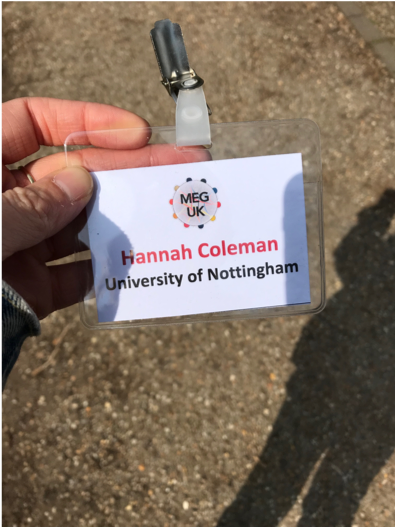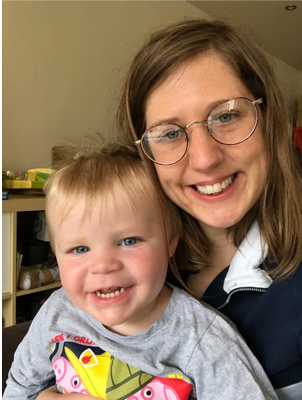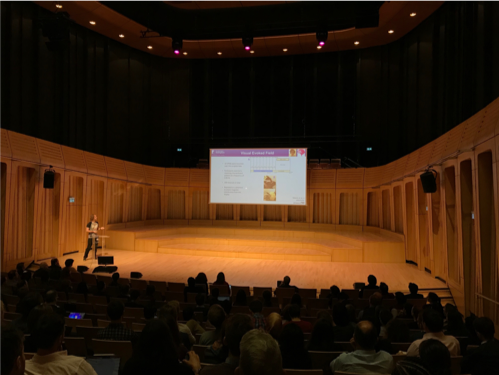July 12, 2019, by Dr. Meghan Gray
MEG UK 2019: Hannah’s first conference
Guest post by regular contributor Hannah Coleman, who has just completed her second year as a BSc Physics student.
Over the Easter Break I had the opportunity to attend my first academic conference in Cardiff. It is unusual for undergraduates to attend conferences, but not unheard of. As I am very keen to embark on a career in academia, I saw this as an opportunity to find out more about the field, and about academic life in general; to get a glimpse of what my life could be like. I was basically a nerdy hanger-on.

This year’s conference took place at the beautiful Royal Welsh College of Music & Drama, and was organised by the University of Cardiff. As the conference is one of the few that are free to attend, and it coincided with the Easter break (and my dear father was able to offer me a bed for the duration), it seemed like the perfect opportunity.
MEG UK has been running for over ten years, and initially started as a meeting for the various heads of the magnetoencephalography (MEG) groups around the country. MEG is a functional neuroimaging technique, and the School of Physics and Astronomy at the University of Nottingham are very strong in this area of research, most recently publishing a paper in Nature on a pioneering new wearable MEG scanner. What I find so incredible about the work of the MEG group at Nottingham is that not only are they involved in cutting edge, life changing (even life-saving) research, but it’s such a multidisciplinary and collaborative endeavour.
I joined most of the Nottingham MEG crew for the road trip down from campus on the Sunday evening. I got to know most of them last summer helping out with a few outreach events, and it was a pleasure to hang out with them (and have someone help me overcome my ignorance on numerous occasions) in the Welsh capital.
The first day was a workshop dedicated to machine learning, which I found fascinating. It’s amazing to see how many different ways we can apply machine learning to data analysis and solving scientific problems. The first speaker that day, Dr. Karim Jerbi, gave a thorough introduction to machine learning and its definition, which was super helpful for a newbie like me. This was followed by talks on how machine learning could be applied to psychology, neurophysiology and medical physics.

By the end of the day my brain was already mush. I had expected not to understand much, and probably lost the thread of most talks after the first few minutes, but it was great to be exposed to so many different areas of research. The workshop came to a close at 17:30, but the fun didn’t stop there. We were then moved on to a drinks reception at The Cardiff University Brain Research Imaging Centre (CUBRIC), just down the road (and the home of MEG at Cardiff). I was nervous about being an undergrad surrounded by postgrads and academics, and not knowing what to talk about, but I had no need to be and ended up chatting to some very interesting people. Some of the delegates I spoke to were giving presentations or had posters on display, and it was nice to be able to meet everyone in a more informal context and be able to recognise some faces over the next day or so.
I was woken up early the following morning by the cheeky chirps of my younger brothers climbing the stairs, notifying me it was time to play. It was lovely to be able to spend the mornings with them, despite the slightly groggy head from the previous evenings. After a breakfast of toast, trucks and Toy Story 3, it was time to head across the beautiful Bude Park to the conference.


I had made a deal with myself that I was going to keep up with some revision, so I ducked out of the odd session here and there to relieve my guilt. It was also nice to take a break from the intensity of the talks. I chatted to others, who also confided that they struggled to follow along to talks outside of their own research area, which was certainly reassuring.
What I did enjoy about the conference was the emphasis on early career researchers. There were plenty of PhD researchers delivering talks and presenting posters, and most of the questions were helpful rather than patronising. As the conference is free, it’s also a really good first conference for many PhD researchers (and undergrads!) to attend. For me, the stand out session was the poster pitches and presentations. The pitches allowed me to get an overview of the research on display, and the poster presentations allowed to me to chat one on one with researchers and ask more specific questions, and get responses pitched more at my level. That was the point where I could really marvel at the breadth of research being undertaken and how it all overlaps.
After filling our brains with information in the day, we would typically carry the conversation onto the bar afterwards. One other highlight was inadvertently bringing half of the conference to the bar of local craft brewers, Tiny Rebel, on a chilly Tuesday evening. I think the staff had expected a rather quiet night until we all showed up.


I don’t think I expected the conference experience to be as full on as it was, but it was an absolute blast and I learnt a lot. I always thought the further up the academic ladder you went, the more specialised you became, and while that is still the case, I hadn’t quite appreciated just how much collaboration there is within and across disciplines. I’m also still surprised by how open everyone is, and how keen they are to discuss their research, no matter what level they may be pitching at. Maybe I’m still far too naïve, but this definitely feels like the right career path for me. I’d like to thank Matt Brookes and his MEG team for letting me tag along for the ride. It certainly hasn’t put me off wanting to pursue a PhD just yet!
No comments yet, fill out a comment to be the first

Leave a Reply